词缀
图片预览
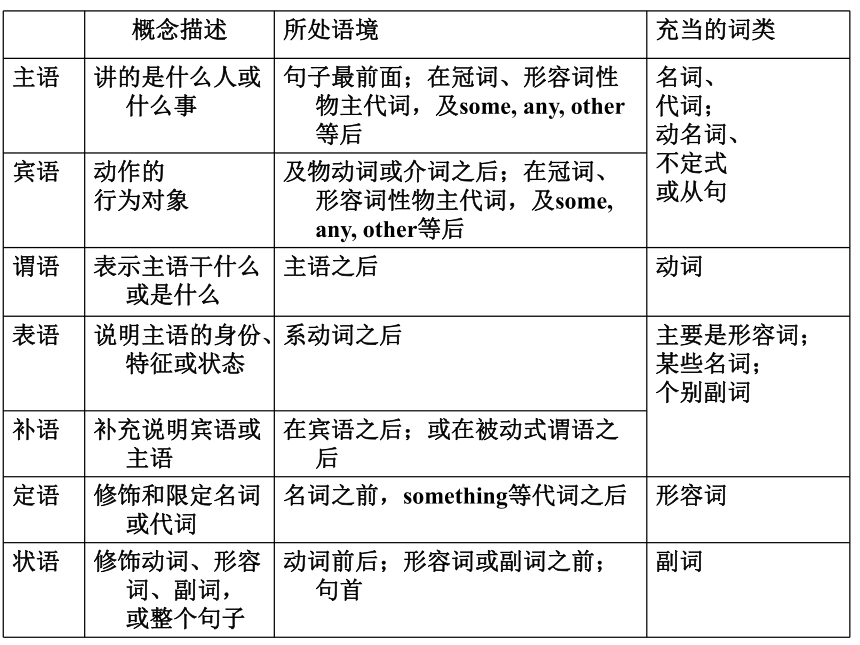
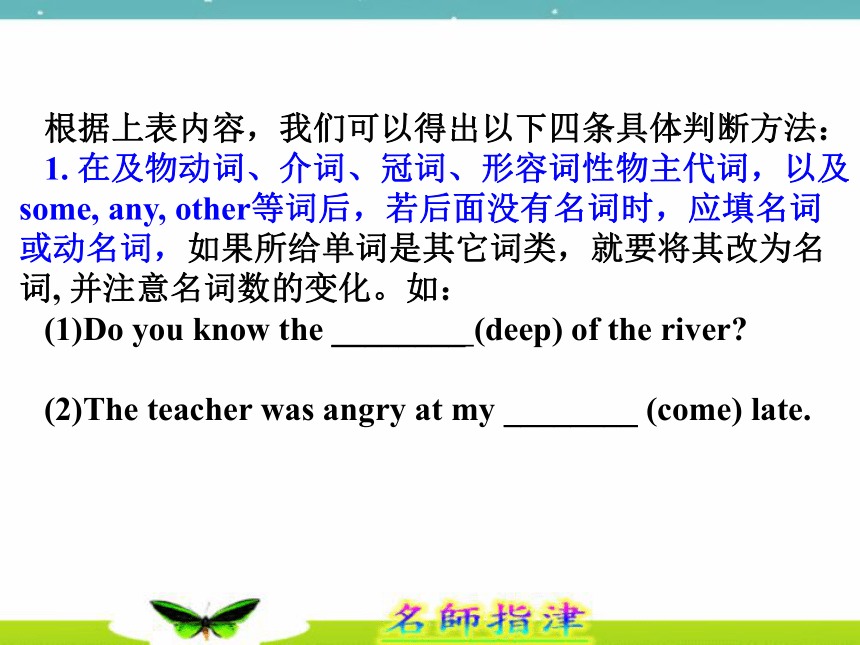
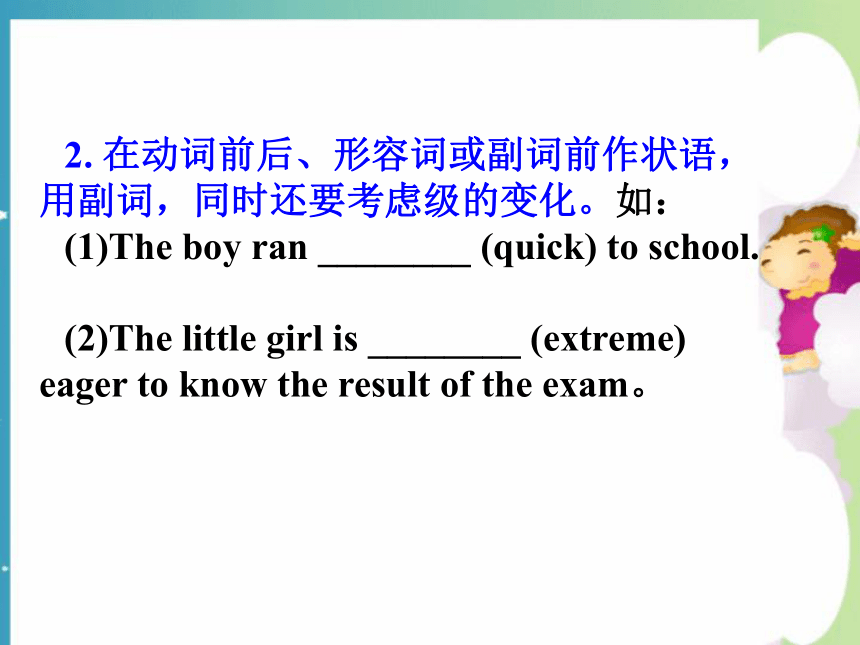
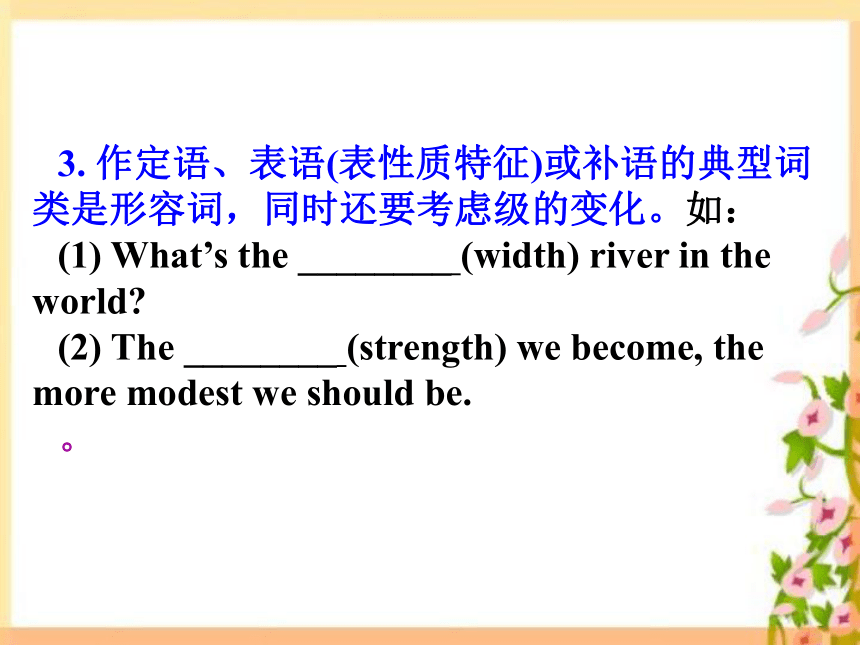
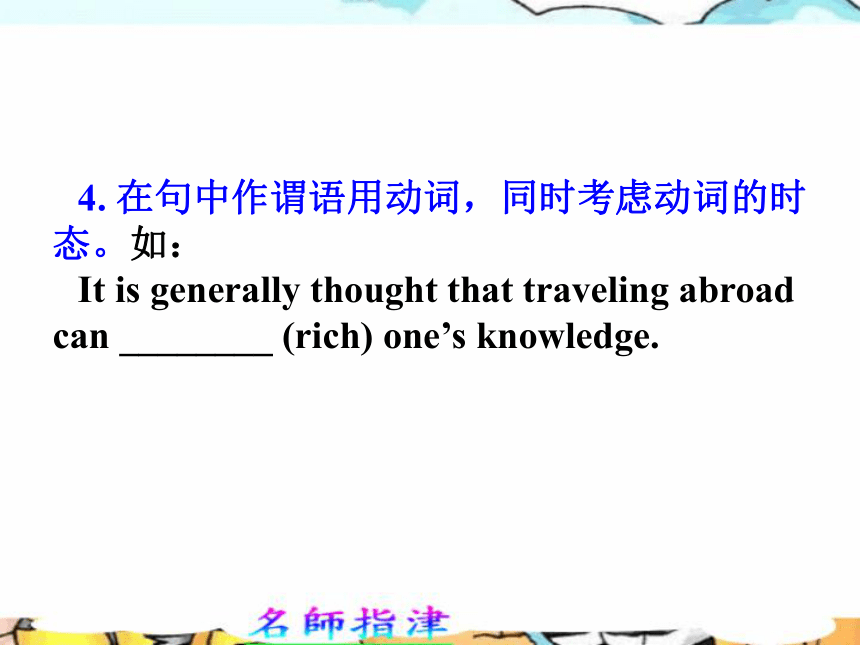
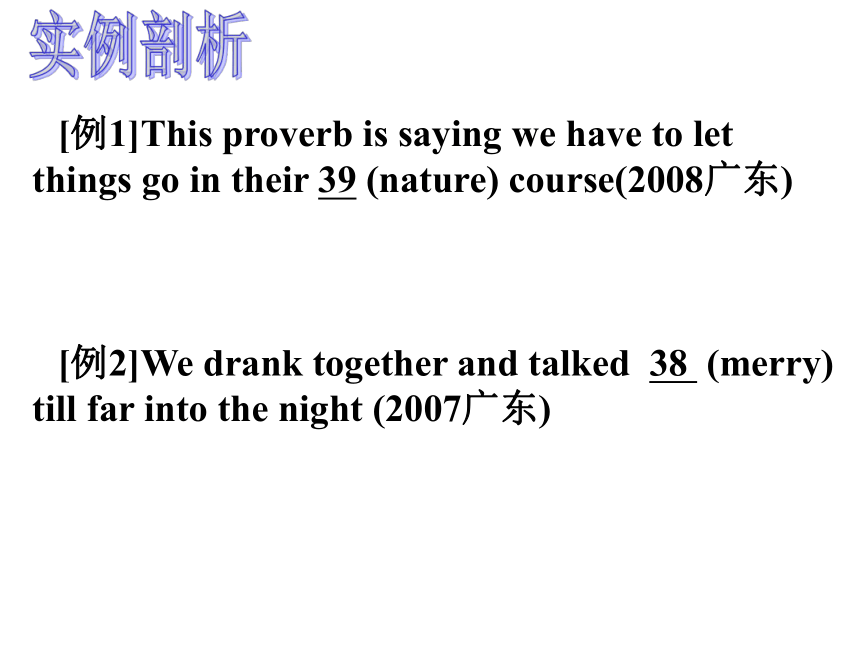
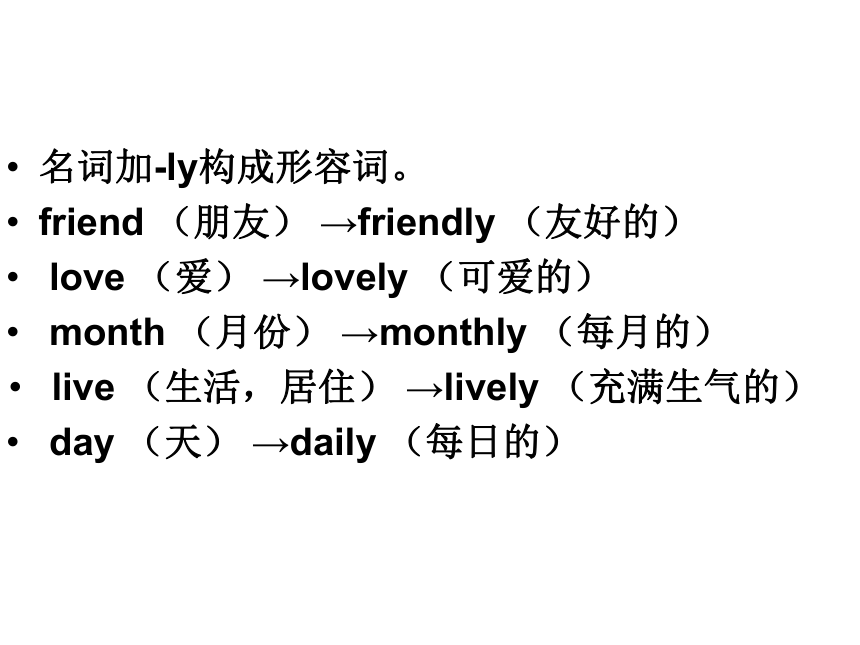
文档简介
课件15张PPT。根据上表内容,我们可以得出以下四条具体判断方法:
1. 在及物动词、介词、冠词、形容词性物主代词,以及some, any, other等词后,若后面没有名词时,应填名词或动名词,如果所给单词是其它词类,就要将其改为名词, 并注意名词数的变化。如:
(1)Do you know the ________ (deep) of the river?
(2)The teacher was angry at my ________ (come) late.
2. 在动词前后、形容词或副词前作状语,用副词,同时还要考虑级的变化。如:
(1)The boy ran ________ (quick) to school.
(2)The little girl is ________ (extreme) eager to know the result of the exam。3. 作定语、表语(表性质特征)或补语的典型词类是形容词,同时还要考虑级的变化。如:
(1) What’s the ________ (width) river in the world?
(2) The ________ (strength) we become, the more modest we should be.
。4. 在句中作谓语用动词,同时考虑动词的时态。如:
It is generally thought that traveling abroad can ________ (rich) one’s knowledge.[例1]This proverb is saying we have to let things go in their 39 (nature) course(2008广东)
[例2]We drank together and talked 38 (merry) till far into the night (2007广东)
实例剖析名词加-ly构成形容词。
friend (朋友) →friendly (友好的)
love (爱) →lovely (可爱的)
month (月份) →monthly (每月的)
live (生活,居住) →lively (充满生气的)
day (天) →daily (每日的)名词加-y构成形容词。如:
rain (雨水) →rainy (多雨的)
wind (风) →windy (多风的,风大的)
cloud (云) →cloudy (多云的,阴天的) snow (雪)→ snowy (多雪的)
sun (太阳)→ sunny (多阳光的,明朗的)
?[特别提醒:别忘了双写n]
luck (运气)→ lucky (幸运的)
noise (嘈杂声) →noisy (嘈杂的,喧闹的)
?[特别提醒:别忘了去掉e]
health (健康) →healthy (健康的)形容词变副词的规则: 1.一般情况下直接加“ly”,如quick---quickly
2.以辅音字母加y结尾的形容词要变y为i,然后再加-ly。如:busy-busily; angry-angrily; easy-easily 如happy---happily 3 以le结尾的词 去e加y
gentle-gently possible-possibly
terrible-terribly;
以-ue结尾的形容词要先去掉e,然后再加ly。 true-truly; 其他以e结尾的词 一律加ly
nice-nicely wise-wisely polite-politely wide-widely brave careful
heavy happy
strong quick
quiet beautiful
terrible true
gentle fortunate
comfortable
名词加-ful构成形容词,表示肯定。 use (使用) →useful (有用的,有益的) help (帮助) →helpful (有帮助的,有益的) harm (伤害,损害) →harmful (有害的) forget (忘记) →forgetful (健忘的) beauty (美丽) →beautiful (美丽的) [特别提醒:别忘了把-y变成-i,再加-ful]
care (关心,小心) →careful (小心的,仔细的) pain (疼痛) →painful (疼痛的)
wonder (惊奇,感到奇怪) →wonderful (极好的) color (颜色) →colorful (彩色的;色彩艳丽的) thank (感谢) →thankful (感激的,欣赏的名词加-less构成形容词,表示否定 Brain头脑—brainless无头脑的,愚蠢的,
breath呼吸—breathless喘气的,使人屏气的, care关心—careless粗心的,不关心的,
end结束—endless无止境的,没完没了的,
fruit水果—fruitless没有成果的,
help帮助—helpless无助的
hope希望—hopeless没有希望的
rest休息—restless不得休息的
tire疲劳—tireless不倦的
use使用—useless无用的, 不锈钢菜刀
stainless steel knife,无线话筒
wireless microphone。在某些名词后加-ous构成形容词。如:
danger (危险) →dangerous (危险的) fame (名声,名望) →famous (著名的)
?[特别提醒:别忘了去掉e]名词加-en构成形容词。如:
wool (羊毛) →woolen (羊毛的) wood (木头) →wooden (木制的) gold (金子) →golden (金子般的)在某些名词后加-ish构成形容词。如:
fool(傻瓜)→ foolish(愚蠢的)
Spain(西班牙)→ Spanish(西班牙的)
?[特别提醒:别忘了去掉i]
1. 在及物动词、介词、冠词、形容词性物主代词,以及some, any, other等词后,若后面没有名词时,应填名词或动名词,如果所给单词是其它词类,就要将其改为名词, 并注意名词数的变化。如:
(1)Do you know the ________ (deep) of the river?
(2)The teacher was angry at my ________ (come) late.
2. 在动词前后、形容词或副词前作状语,用副词,同时还要考虑级的变化。如:
(1)The boy ran ________ (quick) to school.
(2)The little girl is ________ (extreme) eager to know the result of the exam。3. 作定语、表语(表性质特征)或补语的典型词类是形容词,同时还要考虑级的变化。如:
(1) What’s the ________ (width) river in the world?
(2) The ________ (strength) we become, the more modest we should be.
。4. 在句中作谓语用动词,同时考虑动词的时态。如:
It is generally thought that traveling abroad can ________ (rich) one’s knowledge.[例1]This proverb is saying we have to let things go in their 39 (nature) course(2008广东)
[例2]We drank together and talked 38 (merry) till far into the night (2007广东)
实例剖析名词加-ly构成形容词。
friend (朋友) →friendly (友好的)
love (爱) →lovely (可爱的)
month (月份) →monthly (每月的)
live (生活,居住) →lively (充满生气的)
day (天) →daily (每日的)名词加-y构成形容词。如:
rain (雨水) →rainy (多雨的)
wind (风) →windy (多风的,风大的)
cloud (云) →cloudy (多云的,阴天的) snow (雪)→ snowy (多雪的)
sun (太阳)→ sunny (多阳光的,明朗的)
?[特别提醒:别忘了双写n]
luck (运气)→ lucky (幸运的)
noise (嘈杂声) →noisy (嘈杂的,喧闹的)
?[特别提醒:别忘了去掉e]
health (健康) →healthy (健康的)形容词变副词的规则: 1.一般情况下直接加“ly”,如quick---quickly
2.以辅音字母加y结尾的形容词要变y为i,然后再加-ly。如:busy-busily; angry-angrily; easy-easily 如happy---happily 3 以le结尾的词 去e加y
gentle-gently possible-possibly
terrible-terribly;
以-ue结尾的形容词要先去掉e,然后再加ly。 true-truly; 其他以e结尾的词 一律加ly
nice-nicely wise-wisely polite-politely wide-widely brave careful
heavy happy
strong quick
quiet beautiful
terrible true
gentle fortunate
comfortable
名词加-ful构成形容词,表示肯定。 use (使用) →useful (有用的,有益的) help (帮助) →helpful (有帮助的,有益的) harm (伤害,损害) →harmful (有害的) forget (忘记) →forgetful (健忘的) beauty (美丽) →beautiful (美丽的) [特别提醒:别忘了把-y变成-i,再加-ful]
care (关心,小心) →careful (小心的,仔细的) pain (疼痛) →painful (疼痛的)
wonder (惊奇,感到奇怪) →wonderful (极好的) color (颜色) →colorful (彩色的;色彩艳丽的) thank (感谢) →thankful (感激的,欣赏的名词加-less构成形容词,表示否定 Brain头脑—brainless无头脑的,愚蠢的,
breath呼吸—breathless喘气的,使人屏气的, care关心—careless粗心的,不关心的,
end结束—endless无止境的,没完没了的,
fruit水果—fruitless没有成果的,
help帮助—helpless无助的
hope希望—hopeless没有希望的
rest休息—restless不得休息的
tire疲劳—tireless不倦的
use使用—useless无用的, 不锈钢菜刀
stainless steel knife,无线话筒
wireless microphone。在某些名词后加-ous构成形容词。如:
danger (危险) →dangerous (危险的) fame (名声,名望) →famous (著名的)
?[特别提醒:别忘了去掉e]名词加-en构成形容词。如:
wool (羊毛) →woolen (羊毛的) wood (木头) →wooden (木制的) gold (金子) →golden (金子般的)在某些名词后加-ish构成形容词。如:
fool(傻瓜)→ foolish(愚蠢的)
Spain(西班牙)→ Spanish(西班牙的)
?[特别提醒:别忘了去掉i]
同课章节目录
